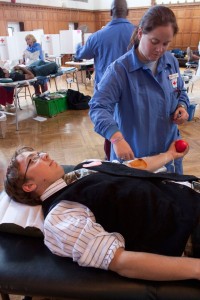After recovering from a sharp decline in blood donations resulting from schools being out of session, the American Red Cross is hosting a series of blood drives to continue meeting the constant demand.
The New York-Penn region of the Red Cross released a statement in mid-August asking for A positive, B positive and O positive donations to meet specific regional hospital needs, Marianna Schreyer, communications manager for the New York-Penn region, said.
Since then, the Red Cross was able to meet that need by holding a chain of blood drives in the region leading up to and during Labor Day weekend. With schools up and running again for many students, the Red Cross was able to collect enough blood on campuses and in communities across the country to respond to the acute shortage, Schreyer said.
Ithaca College’s Red Cross club, led by sophomore co-presidents Shayna Goldfine and Steve Kahlar, has set a goal of doubling last year’s blood collection this semester, Goldfine said.
“I love donating blood,” Goldfine said. “It gives you this sense of helping someone, and it’s not like you even have to do a lot.”
On Oct. 5 and 6, the Red Cross club will host blood drives in Emerson Suites. The college has also challenged Tompkins Cortland Community College to see which college can collect the most blood in two days.

“It’s the first time we are doing a two-day blood drive, but we are hoping it will work out,” Goldfine said. “We have way too many people come in at blood drives to where we don’t have enough time and power to handle everybody. We’ve had to turn away walk-ins.”
In the coming months, the Red Cross will also host blood drives at Cornell University and other locations in the area. The next drives will be held from 11:30 a.m. to 4:30 p.m. Friday at the Ithaca YMCA on Graham Road, and from noon to 5 p.m. Tuesday and Sept. 27 in Williard Straight Hall at Cornell.
The national Red Cross needs more than 38,000 blood donations every day to supply basic needs, according to its website. College and high school students make up about 15 percent of all donors, and college-age donors are becoming increasingly important since many go on to be consistent blood donors, Schreyer said.
“Collecting blood from college campuses is always great because these are people who have just reached donating age,” Schreyer said. “Hopefully they’ll have a positive donating experience and it will become a lifelong habit for them.”
But despite the constant need for blood, the Red Cross has rules preventing a large portion of the U.S. population from donating. Less than 38 percent of the country’s population is eligible to donate blood, according to the Red Cross website. Many of these reasons are medical — like certain blood disorders or diseases that could be transmitted through a blood transfusion — but some are related to lifestyle.
According to the Red Cross’ website, a person is prohibited from donating blood if they are a male who has had sexual contact with another male, even once, since 1977; have ever taken money, drugs or other payment for sex since 1977; or have had sexual contact in the past 12 months with anyone described above. There are also rules regarding those who were born or have traveled out of the country and people who have tattoos.
Some students, like senior Elise Springuel, face these challenges when it comes to donating blood. Springuel said she has always wanted to donate, but can’t because of the restrictions that apply to her. Springuel recently got two tattoos and traveled to Africa and the Middle East. These scenarios prohibit her from giving blood.
“I’m actually very angry about the restrictions,” she said. “Many of them are arbitrary. … The rules affect so many people and there is such a shortage of blood.”
Springuel said she hopes to donate blood in the next blood drive, but doesn’t know if she will be allowed to.
Disputes on some controversial restrictions are currently at a legislative standstill.
Schreyer said though the restrictions affect many college students, the Red Cross doesn’t have much jurisdiction over making changes to them.
“The regulations regarding blood donations are handed down to us by the FDA,” Schreyer said. “We really don’t have any say in it.”
On June 10, a federal panel of members of the U.S. Department of Health and Human Services Advisory Committee on Blood Safety and Availability met to discuss the current controversy surrounding blood donations from men who have had sexual contact with other men in the past 33 years. The committee voted against recommending the changes to the Red Cross blood donation criteria.
The committee stated its final decision in a press release sent out after the ruling.
“We find that currently available scientific data are inadequate to support change to a specific alternative policy,” the release read.
However, some college students are still doing what they can. Last year, the college’s Red Cross club had 127 people donate and was able to give blood to 337 people in need.
Goldfine said the Red Cross club will continue hosting blood drives on campus throughout the year, including a drive in early December.
Goldfine said it’s essential for students at the college to give blood or assist at blood drives if restrictions prevent them from actively donating. For Goldfine, giving blood is a simple way to make a big impact.
“I’ve always wanted to donate blood, and I started donating when I was 17,” she said. “I have O negative so I always felt, ‘Why not give back something that other people need?’”







